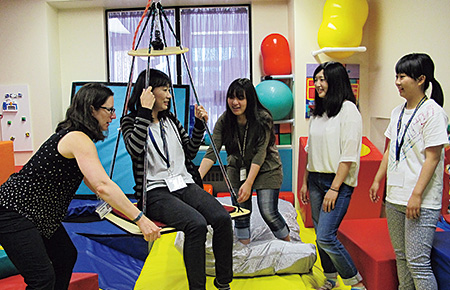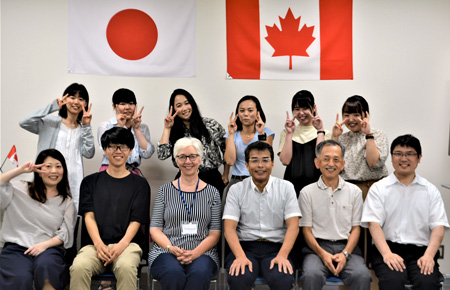
Objectives and Characteristics of the Curriculum
The objective of our program is to nurture competent Occupational Therapists (OTRs). Toward this goal, our curriculum is stratified to make gradual development of professional competency possible. This is built for the students to proceed from basics to professional knowledge and skills. This concept is depicted in Fig.1. Ultimately, through graduation thesis writing, students will build the necessary skills not only as a clinician but also as a researcher.

Qualifications and Careers
Upon successful completion of our program, including nearly 1,000 hours of fieldwork, students are eligible for the national licensure examination for OTR. As a result of careful educational practice, our exam pass rate has been over 90% in the last five years. Our alumni work in a variety of areas including medical agencies, healthcare centers, assisted-living facilities, and domiciliary care. Our graduate school is also one of the choices available for the graduates.
International Activities


Until now we have conducted international exchange programs with two foreign universities, namely, Mid-Western University at Phoenix, Arizona, USA, and Queen’s University, Kingston, Ontario, Canada. We offer students opportunities to meet OTRs in other countries. Each program provides the students with rewarding experiences and the hope for their career in the future. In addition, we aim to improve their English-speaking skills through interactions with students of these universities.
Diploma, Curriculum and Admission Policies (Department of Occupational Therapy)
| STEPS Abilities and attitudes of qualified QOL supporters |
Diploma Policy NUHW grants a bachelor's degree to the students who have acquired the following abilities and attributes. |
Curriculum Policy NUHW implements the curriculum as follows in order to help students develop into competent QOL supporters. |
Admission Policy NUHW seeks students who have the following abilities and attributes. |
|
|---|---|---|---|---|
| S | Science & Art Ability to utilize scientific knowledge and skills in academic discipline |
Abilities to utilize their advanced scientific knowledge and skills in occupational therapy | In order to learn basic knowledges and skills for an occupational therapist, and to get abilities to utilize them, the basic and clinical medicine, and specialized subjects related to occupational therapy are provided. In the 1st and 2nd year, specialized basic subjects, such as basic and clinical medicine, and in the 2nd and 3rd year, specialized subjects of occupational therapy are arranged. These acquired skills are evaluated based on the performance of each subjects and the acceptance / rejection of the national examination. | Basic academic skills for subjects in the entrance examination, such as English, Japanese and mathematics, which are equivalent to high school graduation level |
| T | Teamwork & Leadership Ability to work together as a team and to show leadership qualities |
Abilities to demonstrate leadership as occupational therapists for solving clients' problems in interprofessional collaborative practices | In order to learn the cooperativeness and the leadership for a collaboration with other professions, specialized subjects related to occupational therapy are provided.Students will learn the basics of multi-profession collaboration through "Primer of Team Approach", and strengthen them with "Interprofessional Seminar". These acquired skills are evaluated based on the performance of each subjects of Interprofessional Health. | Attitude to listen and understand of opponents' stories and to talk cleary own their opinions, and to cooperate with others |
| E | Empowerment Ability to support clients by giving them powers to promote QOL |
Attitude to be responsible as occupational therapists to promote QOL of clients and their families and with respect and support for their diverse backgrounds | In order to learn the the attitude that values clients' will and the skills to energize them, specialized subjects related to occupational therapy are provided, especially "Fieldwork". "Fieldwork" is characterized by continuous arrangement, "Observation Fieldwork" are provided in the 1st year, "Participation Fieldwork" in the second year, "Assessment Fieldwork" in the 3rd year and "Comprehensive Fieldwork" in the 4th year. These acquired skills are evaluated based on the performance of specialized subjects related to occupational therapy and "Fieldwork". | Attitude to respect the position of an opponent and to help the troubled people with a tender heart |
| P | Problem-solving Ability to find ways of solving problems and propose better solutions |
Abilities to identify problems and provide better solutions for clients with the understandings of the meaning of occupation in social and cultural contexts based on scientifical assesment of occupational therapy | In order to learn the skills to consider logically and judge through learning practical processes of occupational therapy, "Research practicum" and seminar subjects are provided. In the 3rd year, students can get a basic skills through "research methodology" and "practice of research methodology", and in the 4th year, experience the problem solving practice in "Research Practicum". These acquired skills are evaluated based on the performance of "Research Practicum". | Abilities to consider with various view to judge appropriately on matters |
| S | Self-actualization Attitude towards the fulfillment of his/her potential |
Attitude to maintain interests in advanced technology and a wide variety of social issues to contribute as part of their lifelong learning in occupational therapy | In order to acquire the attitudes to realize your own dreams as an occupational therapist, specialized subjects related to occupational therapy are provided. In particular, in order to deepen the awareness and interest for becoming a professional, clinical lectures with actual clients are provided. The attitude are evaluated based on the performance of specialized subjects related to occupational therapy and "Fieldwork". | Strong interests of specialized fields of health, medical care and welfare, and a high motivation to become an occupational therapist |
| Remarks | Refer to University Regulations, Article 1 | Refer to School Manual(Gakusei Binran) | Refer to Guidelines for Applicants(GakuseiBoshu Yohko) | |
| Degree to be awarded | Bachelor of Occupational Therapy | |||
Notes: "STEPS" is a acronym formed from the words, which represent "the five requirements" for qualified QOL supporters.
NUHW stands for Niigata University of Health and Welfare.

